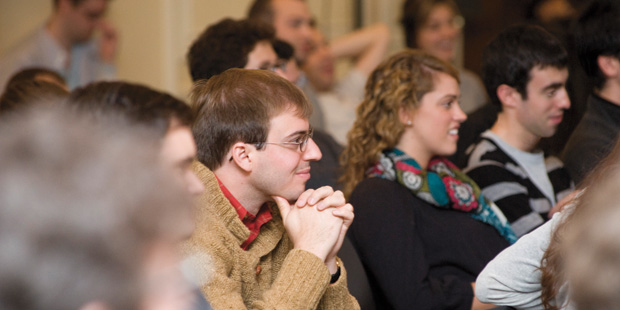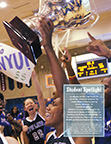Meetings of the Minds
A star-studded weekly Law School event draws crowds and high-minded debate—building community spirit along the way.
Printer Friendly VersionIn a calendar already packed with academic events, Vice Dean Barry Friedman dared to add an ambitious weekly panel discussion in which well-known experts as well as principal actors would address the most current legal issues of the day, including health care reform, corporate bankruptcy, and Citizens United. Launched last September, the Forum has been a resounding success, inspiring lively intellectual debate and discussion in the student body and fostering a deeper sense of community at the school.
One of the keys to the Forum’s success was stipulating that it would be the only event that could be programmed during the Wednesday lunchtime slot. “People are often fragmented into their individual groups,” says Friedman, who organized the series and often moderated the sessions. “The idea was that students might enjoy having one activity that they all could attend.” Indeed, he’s heard the buzz in the halls from students discussing forums even the next day.
To earn this high level of interest and enthusiasm from the student body, Friedman, aided by assistant Sara Lewin, invited students to contribute conceptual ideas. The result is a mix, over 22 sessions, of both evergreen topics—the best approach to acing exams or choosing note topics, for example—and subjects “ripped from the headlines,” à la an episode of Law & Order. “If something’s happening in the world, it’s great to be able to organize a Forum on it,” Friedman says. Most forums pair outside experts with Law School faculty—a good way, he adds, to showcase faculty scholarship. “Some people like to see high-profile individuals,” he says. “I certainly learned that if you ask people, they do come.”
Indeed, one of the most anticipated forums of the academic year was the first one, a debate on health-care reform between Judy Feder of the Georgetown Public Policy Institute, whose ideas on financing reform have been noted by President Obama, and Richard Epstein, Laurence A. Tisch Professor of Law, a noted libertarian. Their sparring produced memorable lines such as Feder’s, “It’s time to stop scaring people into thinking that they’re going to be worse off with health reform,” and Epstein’s, “What you’re watching here is a grotesque concatenation of every bad left-wing liberal policy in the last 40 years, and the time has come to stop it.”
A forecast of the Supreme Court’s most recent term featured probing insight from guests such as Paul Clement, former U.S. solicitor general and Law School adjunct faculty member; Professor Rachel Barkow; and Jeffrey Toobin, author of the bestseller The Nine. “I don’t say out of criticism that the Court is a deeply ideological body,” Toobin said. “I don’t think there is any other way to decide these cases except ideologically. I just wish they’d be honest about it.”
His words would resonate months later, when a major player discussed Citizens United, one of the cases eagerly anticipated by that Supreme Court panel. Legendary First Amendment lawyer Floyd Abrams, who successfully argued in support of Citizens United for the rights of corporations and unions to speak publicly about politics and elections, said, “The fact that four members of the Supreme Court were prepared to sign on to the notion that this speech was not protected by the First Amendment is…very troubling indeed.”
The impressive roster of speakers continued throughout the year. Wall Street’s foe, former New York governor and attorney general Eliot Spitzer, was surprisingly measured on the question of how financial institutions should be regulated in the aftermath of the crisis: “This isn’t about good people and bad people. This is about ideology gone awry, government failure, private sector failure…. Angry populism is not any better a guide to policy than libertarianism masquerading as capitalism.”
For a behind-the-scenes peek at agency regulation in the current administration, longtime Washington insiders C. Boyden Gray, White House counsel to President George H.W. Bush, and Sally Katzen, administrator of the Office of Management and Budget’s Office of Information and Regulatory Affairs in the Clinton administration, joined regulatory policy expert Dean Richard Revesz. Vividly describing the stark contrast between the George W. Bush and Obama views of regulation and policymaking, Katzen spoke of long-suffering employees weeping and embracing members of Obama’s agency review team during the transition.
The Gray and Katzen session had particular appeal for Daniel Nudelman ’12, who had recently covered the topic in his Administrative and Regulatory State class. “We had just studied two executive orders,” he says, “and then we got to see the two people that wrote them. It was pretty awesome.”
Helena Haywoode ’12, concurs: “One thing that the Forum does is allow students to explore current legal topics that there isn’t time to cover in class,” she says, “and it simultaneously exposes us to the leading thinkers in those topics—leading actors, even. It’s a wonderful opportunity.”
That kind of student enthusiasm has gratified Friedman. “It became apparent immediately that there was a real student interest in this sort of thing,” he says. “We wanted a place where students could participate, to feel a part of it. The goal has always been both to educate and to provoke.”
But not to provoke too much, he adds. “Disagreement’s fun, but we often learn the most when people from different viewpoints manage to agree,” says Friedman. “One really nice thing about the Forum is that it’s an extremely civil conversation. Whatever my or anyone else’s hopes were, we far exceeded them.”
—
All of 2010 Student Spotlight


 Multimedia
Multimedia